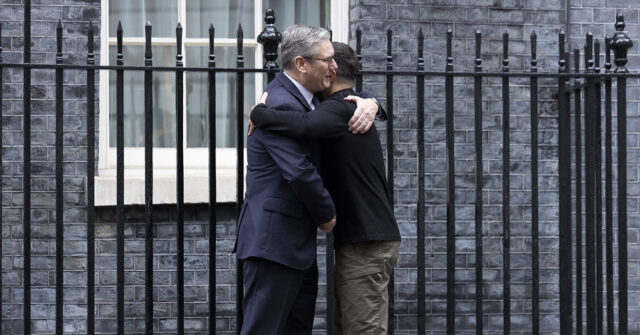Ukrainian President Volodymyr Zelensky recently visited London as part of his European tour aimed at garnering support for Ukraine’s ongoing defense against the Russian invasion. Upon his arrival from Croatia, Zelensky engaged in discussions with British Prime Minister Sir Keir Starmer and other key officials, focusing on his proposed ‘Victory Plan’ and military assistance. The meeting, held in Downing Street, lasted around two hours and included discussions with NATO’s new head, Mark Rutte, and Britain’s defense leadership. Although the outcomes of the talks are unclear, they may not fully compensate for the anticipated summit with U.S. President Joe Biden and Western leaders in Germany, which was canceled due to Hurricane Milton.
During his visit, Sir Keir Starmer expressed a warm reception for Zelensky, noting the importance of ongoing discussions between the two nations regarding military and strategic cooperation. Zelensky showed gratitude towards the British people for their unwavering support since the inception of the conflict, emphasizing the need for stronger ties and assistance from the West. His comments reflected a broader desire to prepare Ukraine for a potential shift in geopolitical dynamics, particularly in light of Donald Trump’s potential return to power in the United States, which could affect future peace negotiations regarding the war with Russia.
Reports suggest that Zelensky’s approach includes strengthening Ukraine’s position on the battlefield through various strategies, including military counter-offensives. His administration has been proactive in retaking territory lost to Russian forces, indicating an intention to secure leverage for any forthcoming peace discussions. The Associated Press articulated that Zelensky’s ‘Victory Plan’ aims to enhance Ukraine’s geopolitical stature and its military capabilities before entering dialogue with Russia. The urgency of this initiative is underscored by predictions of declining financial support for Ukraine from international allies, raising concerns about sustaining its defense efforts.
While specific details regarding the ‘Victory Plan’ were not disseminated publicly, NATO chief Mark Rutte confirmed that discussions included the potential deployment of long-range missiles capable of striking deep into Russian territory. Ukraine has long sought permission to utilize cruise missiles for operations beyond the front lines, targeting Russian airfields and logistical sites. However, Washington’s cautious stance and the reluctance of other allies like the UK to take unilateral action have complicated Ukraine’s ambitions in this area.
Following his discussions in London, Zelensky planned to visit France and Italy and subsequently hold an audience with Pope Francis in the Vatican. He is also scheduled for further meetings in Germany. Earlier, at a conference in Croatia, Zelensky addressed southeastern European leaders, urging them to strengthen their support for Ukraine. He warned that any perceived weakness among Ukraine’s allies would embolden Russian President Vladimir Putin, emphasizing his belief that only a firm stance and robust support could deter further aggression.
In summary, Zelensky’s whirlwind tour of European capitals highlights Ukraine’s ongoing pursuit of military and diplomatic support as it faces the Russian invasion. By reinforcing key alliances and advocating for increased assistance, Zelensky aims to secure essential resources for Ukraine’s defense and to position the country favorably in any potential peace negotiations. His meetings with Western leaders reflect an urgent call for help amid fears of reduced international aid and the unpredictable nature of global politics, particularly with the looming presidential elections in the United States.

